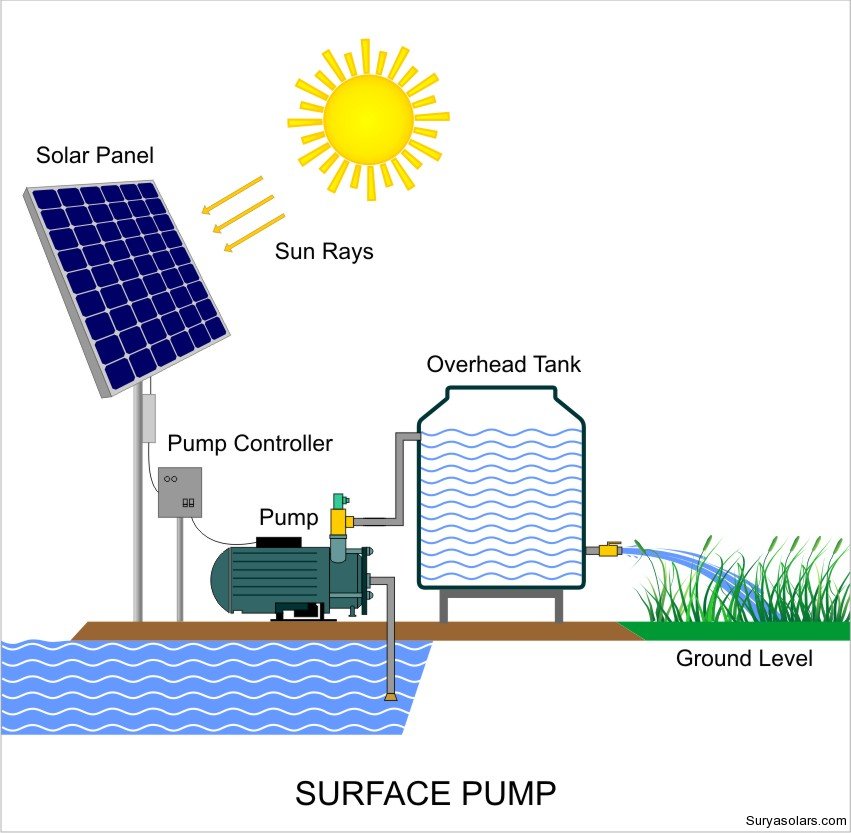Overview
People are becoming more conscious of pollution and the effects of greenhouse gases on the environment. In this scenario, the use of environment-friendly and sustainable energies like solar energy is gaining popularity. Striving to give our future a cleaner and greener planet, Nuetech Solar’s range of excellent quality solar pumps is determined to give the best.
Agriculture is the lifeline of a country like India. Research and development to help the agricultural sector grow more is always on. Affordable equipment, higher yields, and a profitable market are the focus of this endeavor. For this reason, a solar water pump is a perfect fit and is the farmer’s best friend.
What is a solar pump?
Basically, a solar pump is a type of electric pump that runs on electricity generated by solar panels. The energy for these panels comes from the sun. This VFD is utilised to change the speed and output power.
The electricity generated by the PV (photovoltaic) panels or the light collected sunlight drives the solar water pump. Solar energy is used to run the solar powered pump. Electrical wires, a DC water pump, a solar charge controller (MPPT), or VFD drive and a solar panel array are all part of the system. When compared to pumps driven by IC engines or grid energy, solar pumps have a reduced environmental impact.
The solar pump is a wonderful technique for providing water to isolated locations, which is both environmentally and socially beneficial. For water supply, remote villages typically rely on diesel engines and human resources. Solar water pumps are replacing traditional pumps and have a number of advantages, including weather and socioeconomic benefits. These pumps have low maintenance and installation costs and are efficient to operate. A water pump powered by diesel or grid energy is the opposite of this. They are mostly used in locations where there is a shortage of electricity to ensure there is uninterrupted power. Reservoirs and irrigation systems are the greatest applications for these pumps.

Working Principle
The photovoltaic principle is used to power a solar pump. PV (photovoltaic) systems absorb light energy and convert it to electricity during the operation of a solar pump. This generated electricity is supplied to the entire system. The pump’s VFD controls the frequency of motor. To provide the best power point tracking, these VFD modify the output frequency and voltage in real-time, adapting to variations in sunshine intensity.
As the intensity of the sunlight decreases, the water lifting system fulfils the function of switching to the local electricity that serves as additional energy for the water lifting system.
Types of solar-powered water pumps
- Submersible Solar Pumps: Submersible pumps can lift up to 650 feet of water and are well suited for deep wells. These pumps operate directly to switch off, solar panels, and, in certain circumstances, electricity as long as the well water is more than 20 feet above the surface. When the sun shines, the pump, pumps water throughout the day, and the water is stored in tanks to be used as required. Given that the sun cannot shine during all weather conditions, the water cannot be pumped all the time. These solar pumps are mostly used in deep water and in regions where drilling is not possible. Livestock watering, pond aeration, residential water systems, irrigation, pressurisation, and well pumping are all applications for these pumps. A maximum depth of 50 metres is what is recommended for submersible solar pumps.
- Surface Solar Pumps: Pumps like these can be found in streams, storage tanks, shallow wells, and ponds. We use a surface solar water pump when the well’s water supply is less than 20 feet from the ground. These pumps can pump water up to 200 ft or more and can boost water from 20 m below.
- DC Solar Pumps: No battery or VFD is required for this pump as it has an electric motor.
- AC Solar Pumps: The electric motor in an AC solar pump converts direct current to alternating current through an inverter.
Factors that make a difference.
Due to the global energy issue, the globe is now focusing its efforts on producing renewable energy sources. Despite the initial cost, a solar-powered system’s true efficiency can be seen over time. As a renewable energy source, solar energy is a viable choice. At the agricultural level, solar pumps can provide significant socioeconomic and environmental benefits. This innovation can offer reliable power to farm lands, especially in places that are not connected to the energy grid or where traditional liquid fuel supplies are scarce.
- Economically viable
- Water distribution can be managed efficiently
- Easy installation, maintenance, and operation
- You will be a responsible contributor to the green movement

Key Advantage :
- Easy installation
- Low maintenance
- Low operating costs
- Works without fuel
- Easy to transport from one place to another
- There is no need for continuous electricity supply
- High performance and durability
Solar pump for agriculture
Farmers and agribusinesses can expand food production and engage in value-added processing more responsibly now, thanks to the availability of clean, reliable energy like solar power. It also enables farmers in off-grid locations to replace costly diesel generators with innovative, cleaner technologies like solar water irrigation. Nuetech sees solar pumps as a revolution in irrigation. Especially for those agriculturists in remote corners with little access to continuous electricity and no reliable manpower, solar pumps will be a boon.
